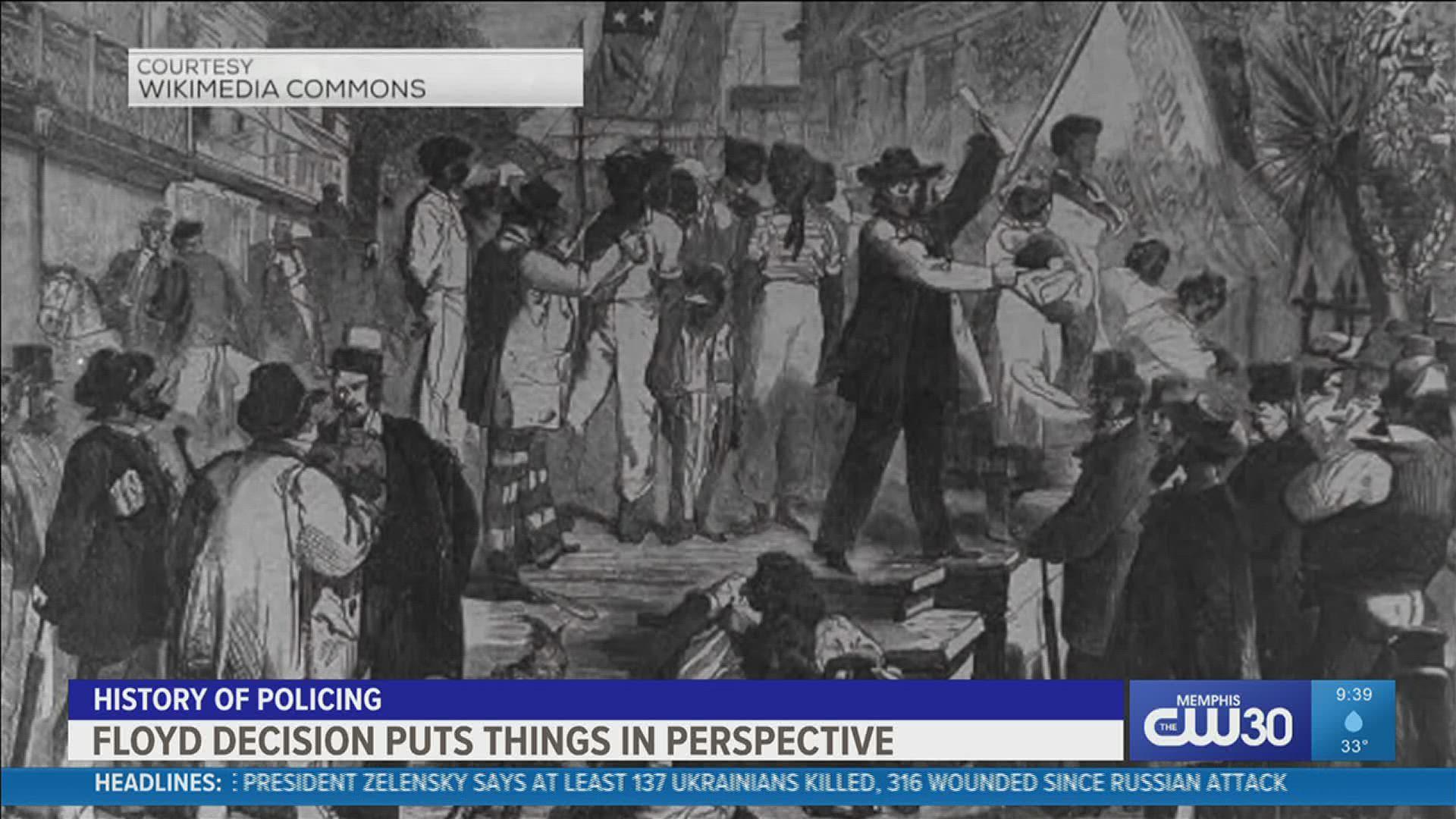MEMPHIS, Tenn. — The three former Minneapolis police officers charged with denying George Floyd his civil rights at the time of his murder were found guilty on all federal charges.
The jury’s decision came down Thursday afternoon after nearly 13 hours of deliberations. It has also furthered conversations around policing and minorities.
We took a look at the history of policing from the slavery era to today and its handling of racism and poverty.
There's a history of policing in the United States that many may not know.
We're familiar with the phrase, “to protect and to serve,” but that idea may be different from its initial purpose.
America’s history of policing began in the 1700s during colonial days.
As Rhodes College’s Dr. Duane Loynes Sr. explained, slavery fueled the economy.
“A lot of this begins in 1704 in South Carolina with the advent of slave patrols,” Loynes said.
Those patrols were made up of white men.
“They will organize to surveil Black bodies intimidate black people and enforce discipline,” said Loynes.
By the end of the 1700s, enslaved Blacks in Charleston, South Carolina not only worked on plantations but in the cities as well.
“So, you have the creation of this force known as the Charleston City Watching Guard late 1790s or so, and their job is to do the exact same thing,” said Loynes.
It wasn’t until years later that we saw a formal police department around 1838 in Boston.
“They started because in the 1800s you have rapid industrialization. You have all of these immigrant workers are working in factories, and they're saying, ‘Wait a minute. These wages, these working conditions, it's not fair,’” said Loynes.
As a result, the Boston Broad Street Riots took place with 15,000 Irish immigrants protesting.
“The military is called in, and the white and wealthy citizens of Boston said “you know what, we need a force to tamp down on civil protest and maintain the social order,” said Loynes.
The next year, a police department was formed in Boston and in other cities, that pattern continued.
“When you have the formation of these initial police departments, it has nothing to do with justice. It has nothing to do with crime. It has to do with maintaining social inequity and maintaining the status quo,” said Loynes.
How did we get the phrase, “to protect and serve”?
“That comes from the LAPD,” said Loynes. “They had a local magazine police officers called Beat magazine in 1955. They had a contest. We need a good motto for the LAPD, and one officer submitted to protect him to serve LAPD.”
It's a contradiction from its history and what we believe today.
“We're still thinking, police do one thing, and we're not willing to admit the sad history that police, policing has never been about protecting and serving the general population. It's always been about maintaining social control,” said Loynes.
He said that control is also seen with the war on crime and the war on drugs. How does this impact minorities today?
“What you're really getting at is this question: How does it feel to be a problem, not to be an individual who has problems…In America when you're a Black body, you're perceived by definition to be criminal to be dangerous to be more prone to criminality,” said Loynes. “Now you're engaging with law enforcement officers and it's their job to deal with criminals to deal with people who don't belong.”
It's a fear powered by the faces of individuals such as Trayvon Martin, Breonna Taylor, and George Floyd.
How do we fix it? There's reform such as more focus on mental health and hiring minority officers.
“Here's a dirty little secret: studies indicate that black officers are just as brutal and at time even more brutal against black bodies as their white counterparts,” said Loynes.
Why?
“If a system is problematic. It doesn't matter who you plug into the system, you're going to get the same result,” said Loynes.
The second option is radical change.
“We have to radically reimagine what we mean by public safety, and we have to essentially start this thing from scratch,” said Loynes.
By pressing restart, Loynes said you have to address racism and poverty.
“Give people hope. Give them a way to support their families and stop excluding people from the opportunity to improve their lives based upon race,” said Loynes.

